2黄金鉴赏-CHAPTER1
朗文2A Chapter1-单元试卷
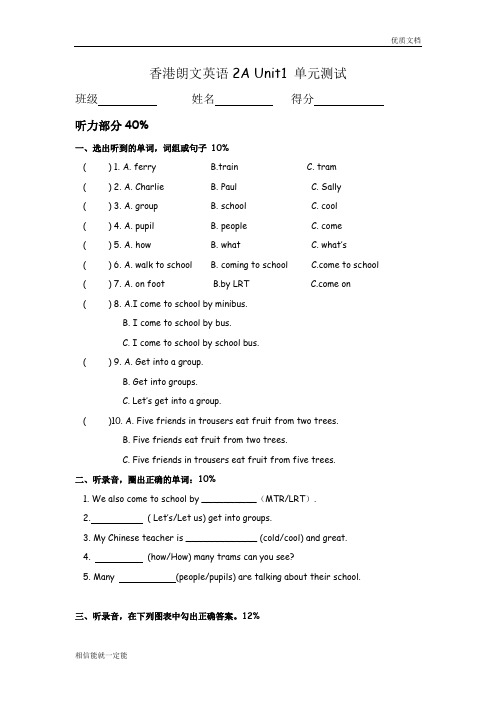
香港朗文英语2A Unit1 单元测试班级姓名得分听力部分40%一、选出听到的单词,词组或句子 10%( ) 1. A. ferry B.train C. tram( ) 2. A. Charlie B. Paul C. Sally ( ) 3. A. group B. school C. cool( ) 4. A. pupil B. people C. come ( ) 5. A. how B. what C. what’s ( ) 6. A. walk to school B. coming to school e to school ( ) 7. A. on foot B.by LRT e on ( ) 8. A.I come to school by minibus.B. I come to school by bus.C. I come to school by school bus.( ) 9. A. Get into a group.B. Get into groups.C. Let’s get into a group.( )10. A. Five friends in trousers eat fruit from two trees.B. Five friends eat fruit from two trees.C. Five friends in trousers eat fruit from five trees.二、听录音,圈出正确的单词:10%1. We also come to school by __________(MTR/LRT).2. ( Let’s/Let us) get into groups.3. My Chinese teacher is _____________ (cold/cool) and great.4. (how/How) many trams can you see?5. Many (people/pupils) are talking about their school.三、听录音,在下列图表中勾出正确答案。
Chapter1(1)

Properties:
- Finite (easy) - Correct (hard) - Efficient (complexity) - Input - Output
Classifications: Some differences:
- Numerical - Nonnumerical - Serial - Parallel -……
Analysis Basics
- Algorithm vs. Problem - Algorithm vs. Procedure - Algorithm vs. Program
What is a problem
Definition:
- A mapping/relation between a set of input instances (domain) and an output set (range)
Analysis Basics
Initializatio n is not very important!
Why and What to Analysis
Purposes:
- choose between algorithms of solving a given problem - count the number of basic operations with respect to N input values - analysis is done without regard to any specific computer
N characters in the file The number of assignment (=) is 257 The total time: f(N) as the time of a certain basic operation. E.g., f(N)=N+257+1. N∞, f(N) ≈ N
初二英语Chapter1解释句子
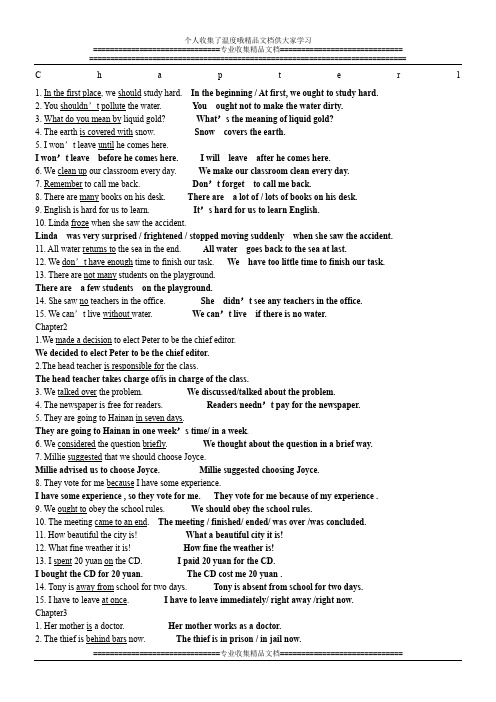
C h a p t e r 11. In the first place, we should study hard. In the beginning / At first, we ought to study hard.2. You shouldn’t pollute the water. You ought not to make the water dirty.3. What do you mean by liquid gold? What’s the meaning of liquid gold?4. The earth is covered with snow. Snow covers the earth.5. I won’t leave until he comes here.I won’t leave before he comes here.I will leave after he comes here.6. We clean up our classroom every day. We make our classroom clean every day.7. Remember to call me back. Don’t forget to call me back.8. There are many books on his desk. There are a lot of / lots of books on his desk.9. English is hard for us to learn. It’s hard for us to learn English.10. Linda froze when she saw the accident.Linda was very surprised / frightened / stopped moving suddenly when she saw the accident.11. All water returns to the sea in the end. All water goes back to the sea at last.12. We don’t have enough time to finish our task. We have too little time to finish our task.13. There are not many students on the playground.There are a few students on the playground.14. She saw no teachers in the office. She didn’t see any teachers in the office.15. We can’t live without water. We can’t live if there is no water.Chapter21.We made a decision to elect Peter to be the chief editor.We decided to elect Peter to be the chief editor.2.The head teacher is responsible for the class.The head teacher takes charge of/is in charge of the class.3. We talked over the problem.We discussed/talked about the problem.4. The newspaper is free for readers. Readers needn’t pay for the newspaper.5. They are going to Hainan in seven days.They are going to Hainan in one week’s time/ in a week.6. We considered the question briefly. We thought about the question in a brief way.7. Millie suggested that we should choose Joyce.Millie advised us to choose Joyce. Millie suggested choosing Joyce.8. They vote for me because I have some experience.I have some experience , so they vote for me. They vote for me because of my experience .9. We ought to obey the school rules. We should obey the school rules.10. The meeting came to an end. The meeting / finished/ ended/ was over /was concluded.11. How beautiful the city is! What a beautiful city it is!12. What fine weather it is! How fine the weather is!13. I spent 20 yuan on the CD. I paid 20 yuan for the CD.I bought the CD for 20 yuan. The CD cost me 20 yuan .14. Tony is away from school for two days. Tony is absent from school for two days.15. I have to leave at once. I have to leave immediately/ right away /right now.Chapter31. Her mother is a doctor. Her mother works as a doctor.2. The thief is behind bars now. The thief is in prison / in jail now.3. Our teacher is kind and beautiful. Our teacher is kind as well as beautiful.4. He no longer lived here. He didn’t live here any longer.5. My friend bought a TV for 2000 yuan. My friend paid 2000 yuan for a TV. My friend spent 2000 yuan on a TV. A TV cost my friend 2000 yuan.6. How much did you pay for the mobile phone?How much did you spend on the mobile phone? How much did the mobile phone cost you?7. The girl owns the beautiful earrings. The beautiful earrings belong to the girl.8. His sunglasses are different from yours. His sunglasses are not the same as yours.9. If I am free, I will go to your party.If I have time, I will go to the party. If I am not busy, I will go to the party.10. Can you show me your new dress? Can you show your new address to me?11. The boy didn’t play basketball. Instead, he went out with his friends.The boy went out with his friends instead of playing basketball.12. The old man lives alone in his house.The old man lives by himself / on his own in his house.13. He denied stealing the vase. He didn’t admit stealing the vase.14. I knocked into someone carelessly. I bumped into someone carelessly.15. In the end, I finished my homework. At last/ Finally, I finished my homework.Chapter41.What useful information it is! How useful the information is!2.Don’t litter things everywhere.here and thereputer may be able to do better than people. Maybe computers can do better than people4.Eric has worse marks in science than Martin. Martin has better marks in science than Eric.5.He is very tired. He can’t walk. He is too tired to walk.6.You never seem to be short of money. It seems that you are never short of money.7.You hardly ever saw computers in the past.almost never / seldom /rarely8.There may be 6 robbers in that bank.Maybe there are9.The boy didn’t realize his mistake.was unaware of10.Is a computer cleverer than I am? Am I less clever than a computer?11.He is the tallest student in his class. No one is taller than him in his class.12.The question is easy. This is an easy question.13.Tony and Millie have the same age. Tony is as old as Millie.ics are exciting to watch. It is exciting to watch comics.15.The camel is heavier than the fox. The fox is not as heavy as the camel.Chapter51.I have tried for 2 years to pass the exam.It has been 2 years since I began to try to pass the exam.2.It was too big for them to take with them.It was so big that they couldn’t take it with them.3.Outside stood his parents. His parents stood outside.4.They all went out, including Lucy.as well as5.We moved to Shenzhen five years ago. We have been in Shenzhen for five years.6.He didn’t want it any more. He no more wanted it.7.They take turns to clean the room. They clean the room in turns.8.My father succeeded in solving the problem. My father solved the problem successfully.9.The man joined the army after he left school.The man didn’t join the army until he left school.10.The food was too little for them to eat. The food was so little that they couldn’t eat it.11.I like all subjects, except Maths. I don’t like Maths, but I like other subjects.12.He has been the captain for 10 years. He became the captain 10 years ago.13.It has been 20 years since the scientists began to solve the problem.The scientists began to solve the problem 20 years ago.14.He got to Beijing 5 minutes ago. He has been in Beijing for 5 minutes.15.The shop closed 2 hours ago. The shop has been closed for 2 hours.16.The door opened six hours ago. The door has been open for six hours.17.He left Shenzhen five minutes ago. He has been away from Shenzhen for 5 minutes.18.My grandpa died ten years ago. My grandpa has been dead for ten years.19.They borrowed it last week. They have kept it since last week.20.I bought a pen two hour ago. I have had a pen for two hours.21.He has gone to Beijing for two days. He has been in Beijing for two days.22.He joined the army in 2002. He has been a soldier since 2002.23.My brother joined the army two years ago. My brother has been in the army for two years. Chapter 61.The artist was satisfied with the painting. The painting satisfied the artist.pleased2.You will be extremely fortunate to see her.Very lucky3.He made an apology to the head teacher.said sorry to4.Peter runs faster than any other student in his class. Peter runs fastest in his class.5.He had a careful look at it. He looked at it carefully.6.He runs very slowly. How slowly he runs!7.When did you go to Shanghai? When did you leave for Shanghai?8.In no time, the second bus came.Soon / At once9.I feel awfully sorry to hear that.extremely10.Don’t whisper while the speaker is saying.speak in a low voice11.People take pleasure in watching the games.enjoy12.How politely the salesman behaved! The salesman behaved very politely.13.What about going and watching a comic?How about14.Jacy said sorry to me for his mistake.made and apology to/ apologized toChapter 71.He was very excited. He couldn't go to sleep. He was too excited to go to sleep. He was so excited that he couldn't go to sleep2.Tim and Sam are both 15 years old. Tim is as young as Sam.3.We should help the elderly.the old people4.How curly her hair is! What curly hair she has!Her hair is very curly.5.He did his homework up to 11 o'clock last night.He didn't finish his homework until 11 o'clock last night.6.People cut down a lot of trees every year.A lot of trees are cut down every year.7.The students in our school are up to 4000.as many as8.The light enables us to see better. The light makes us see better.9.There were over 60 students.more than10.We require time to finish the work.need11.He removed the mud from his shoes. He took the mud out of his shoes.12.The length of the river is up to 3000 km. The river is as long as 3000 km.13.The room is large enough for 200 people to see the film together.The room is so large that 200 people can see the film together.。
PeterPan--Chapter1中英文双语阅读
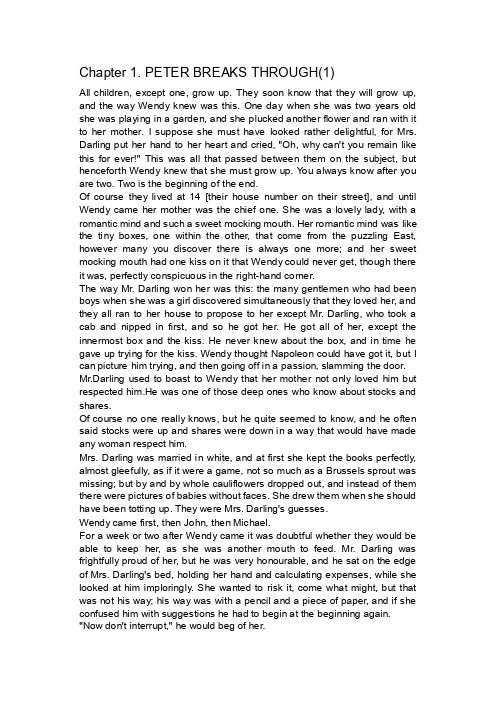
Chapter 1. PETER BREAKS THROUGH(1)All children, except one, grow up. They soon know that they will grow up, and the way Wendy knew was this. One day when she was two years old she was playing in a garden, and she plucked another flower and ran with it to her mother. I suppose she must have looked rather delightful, for Mrs. Darling put her hand to her heart and cried, "Oh, why can't you remain like this for ever!" This was all that passed between them on the subject, but henceforth Wendy knew that she must grow up. Y ou always know after you are two. Two is the beginning of the end.Of course they lived at 14 [their house number on their street], and until Wendy came her mother was the chief one. She was a lovely lady, with a romantic mind and such a sweet mocking mouth. Her romantic mind was like the tiny boxes, one within the other, that come from the puzzling East, however many you discover there is always one more; and her sweet mocking mouth had one kiss on it that Wendy could never get, though there it was, perfectly conspicuous in the right-hand corner.The way Mr. Darling won her was this: the many gentlemen who had been boys when she was a girl discovered simultaneously that they loved her, and they all ran to her house to propose to her except Mr. Darling, who took a cab and nipped in first, and so he got her. He got all of her, except the innermost box and the kiss. He never knew about the box, and in time he gave up trying for the kiss. Wendy thought Napoleon could have got it, but I can picture him trying, and then going off in a passion, slamming the door. Mr.Darling used to boast to Wendy that her mother not only loved him but respected him.He was one of those deep ones who know about stocks and shares.Of course no one really knows, but he quite seemed to know, and he often said stocks were up and shares were down in a way that would have made any woman respect him.Mrs. Darling was married in white, and at first she kept the books perfectly, almost gleefully, as if it were a game, not so much as a Brussels sprout was missing; but by and by whole cauliflowers dropped out, and instead of them there were pictures of babies without faces. She drew them when she should have been totting up. They were Mrs. Darling's guesses.Wendy came first, then John, then Michael.For a week or two after Wendy came it was doubtful whether they would be able to keep her, as she was another mouth to feed. Mr. Darling was frightfully proud of her, but he was very honourable, and he sat on the edge of Mrs. Darling's bed, holding her hand and calculating expenses, while she looked at him imploringly. She wanted to risk it, come what might, but that was not his way; his way was with a pencil and a piece of paper, and if she confused him with suggestions he had to begin at the beginning again. "Now don't interrupt," he would beg of her."I have one pound seventeen here, and two and six at the office; I can cut off my coffee at the office, say ten shillings, making two nine and six, with your eighteen and three makes three nine seven, with five naught naught in my cheque-book makes eight nine seven—who is that moving?—eight nine seven, dot and carry seven—don't speak, my own—and the pound you lent to that man who came to the door—quiet, child—dot and carry child—there, you've done it!—did I say nine nine seven? yes, I said nine nine seven; the question is, can we try it for a year on nine nine seven?""Of course we can, George," she cried. But she was prejudiced in Wendy's f avour, and hewas really the grander character of the two."Remember mumps," he warned her almost threateningly, and off he went a gain. "Mumpsone pound, that is what I have put down, but I daresay it will b e more like thirty shillings—don't speak—measles one five, German measle s half a guinea, makes two fifteen six—don't waggle your finger—whooping-cough, say fifteen shillings"—and so on it went, and itadded up differently e ach time; but at last Wendy just got through, with mumps reduced totwelve s ix, and the two kinds of measles treated as one.There was the same excitement over John, and Michael had even a narrow er squeak; butboth were kept, and soon, you might have seen the three of t hem going in a row to MissFulsom's Kindergarten school, accompanied by t heir nurse.所有的孩子都要长大的,只有一个例外。
Chapter_1__A_General_survey_of_English_vocabulary[1]
![Chapter_1__A_General_survey_of_English_vocabulary[1]](https://img.taocdn.com/s3/m/59778a25482fb4daa58d4b36.png)
Chapter 1 A General survey of English vocabulary一. Basic concepts of words and vocabulary1 - The definition of a word comprises the following points:(1) a minimal free form of a language;(2) a sound unity;(3) a unit of meaning;(4) a form that can function alone in a sentence.A word is a minimal free form of a language that has a given sound and meaning and syntactic function.2- Sound and Meaning: symbolic connection is almost always arbitrary and conventional.A dog is called a dog not because the sound and the three letters that make up the word just automatically suggest the animal in question.3- Old English, the speech of the time was represented very much more faithfully in writing than it is today. The internal reason for this is that the English alphabet was adopted from the Romans, which does not have a separate letter to represent each sound in the language so that some letters must do double duty or work together in combination.Another reason is that the pronunciation has changed more rapidly than spelling over the years, and in some cases the two have drawn far apart.A third reason is that some of the differences were created by the early scribes. Finally comes the borrowing, which is an important channel of enriching the English vocabulary.5 - Vocabulary: All the words in a language make up its vocabulary. Not only can it refer to the total number of the words in a language, but it can stand for all the words used in a particular historical period. We also use it to refer to all the words of a given dialect, a given book, a given discipline and the words possessed by an individual person. The general estimate of the present-day English vocabulary is over million words.6 - Words may fall into the basic word stock and nonbasic vocabulary by use frequency, into content words and functional words by notion, and into native words and borrowed words by origin.7 - The basic word stock is the foundation of the vocabulary accumulated over centuries and forms the common core of the language. Though words of the basic word stock constitute a small percentage of the English vocabulary, yet it is the most important part of it. These words have obvious characteristics.8 - All national character. Words of the basic word stock denote the most common things and phenomena of the world around us, which are indispensable to all the people who speak the languageNatural phenomena/Human body and relations/Names of plants and animals/Action, size, domain, state/Numerals, pronouns, prepositions, conjunctions9 - Stability. Words of the basic word stock have been in use for centuries.10 - Productivity . Words of the basic word stock are mostly root words or monosyllabic words. They can each be used alone, and at the same time can form new words with other roots and affixes.11 - Polysemy. Words belonging to the basic word stock often possess more than one meaning because most of them have undertone semantic changes in the course of use and become polysemous.12 - Collocability . Many words of the basic word stock quite a number of set expressions, idiomatic usages, proverbial sayings and the like.13 - Terminology consists of technical terms used in particular disciplines and academic areas .14 - Jargon refers to the specialized vocabularies by which members of particular arts, sciences, trades and professions communicate among themselves such as in business. 15 - Slang belongs to the sub-standard language, a category that seems to stand between the standard general words including informal ones available to everyone and in-group words like cant, jargon, and argot, all of which are associated with, or most available to, specific groups of the population.Slang is created by changing or extending the meaning of existing words though some slang words are new coinages altogether. Slang is colourful, blunt, expressive and impressive.16 - Argot generally refers to the jargon of criminals.17 - Dialectal words are words used only by speakers of the dialect in question.18 - Archaisms are words or forms that were once in common use but are now restricted only to specialized or limited use.19 - Neologisms are newly-created words or expressions, or words that have taken on new meanings.20 - By notion, words can be grouped into content words and functional words. Content words denote clear notions and thus are known as notional words. They include nouns, verbs, adjectives, adverbs and numerals, which denote objects, phenomena, action, quality, state, degree, quantity.21 - Functional words do not have notions of their own. Therefore, they are also called empty words. As their chief function is to express the relation between notions, the relation between words as well as between sentences, they are known as form words. Prepositions, conjunctions, auxiliaries and articles belong to this category.22 - However, functional words do far more work of expression in English on average than content words.23 - Native words are words brought to Britain in the fifth century by the German tribes; the Angles, the Saxons, and the Jutes, thus known as Anglo-Saxon words.24 - Apart from the characteristics mentioned of the basic word stock, in contrast to borrowed words, native words have two other features:Neutral in style. they are not stylistically specific.Stylistically, natives words are neither formal nor informal whereas the words borrowed from French or Latin are literary and learned, thus appropiate in formal style.Frequent in use. Native words are most frequently used in everyday speech and writing.25 - Words taken over from foreign languages are known as borrowed words or loan words or borrowings in simple terms. It is estimated that English borrowings constitute 80 percent of the modem English vocabulary. The English language is noted for the remarkable complexity and heterogeneity of its vocabulary because of its extensive borrowings26 - Aliens are borrowed words which have retained their original pronunciation and spelling. These words are immediately recognizable as foreign in origin.27 - Semantic-loans. Words of this category are not borrowed with reference to the form. But their meanings are borrowed. In other words, English has borrowed a new meaning for an existing word in the language.二.The development of the English vocabulary1 - It is assumed that the world has approximately 3, 000 (some put it 5, 000 ) languages, which can be grouped into roughly 300 language families on the basis of similarities in their basic word stock and grammar.2 - The Indo-European is one of them. It is made up of most of the languages of Europe, the Near East, and India.3 - They accordingly fall into eight principal groups, which can be grouped into an Eastern set: Balto-Slavic , Indo-Iranian , Armenian and Albanian ; a Western set: Celtic, Italic, Hellenic, Germanic.4 - In the Eastern set, Armenian and Albanian are each the only modern language respectively. The Balto-Slavic comprises such modern languages as Prussian, Lithuanian, Polish, Czech, Bulgarian, Slovenian and Russian.5 - In the Indo-Iranian we have Persian. Bengali, Hindi, Romany, the last three of which are derived from the dead language Sanskrit.6 - In the Western set, Greek is the modern language derived from Hellenic.7 - The Germanic family consists of the four Northern European Languages: Norwegian, Icelandic, Danish and Swedish, which are generally known as Scandinavian languages. Then there is German, Dutch, Flemish and English.8 - Old English (450-1150)Anglo-Saxon as Old English. Old English has a vocabulary of about 50, 000 to 60, 000 words. It was a highly inflected language just like moderm German.Anglo-Saxon as Old English. Old English has a vocabulary of about 50, 000 to 60, 000 words. It was a highly inflected language just like moderm German.9 - Middle English (1150-1500)Although there were borrowings from Latin, the influence on English was mainly Germanic.Between 1250 and 1500 about 9000 words of French origin poured into English. Seventy-five percent of them are still in use today.If we say that Old English was a language of full endings. Middle English was one of leveled endings.10 - Modern English (1500-up to now)Modern English began with the establishment of printing in England.Early (1500-1700) and Late (1700-up to the present) Modern EnglishIn the early period of Modern English, Europe saw a new upsurge of learning ancient Greek and Roman classics. This is known in history as the Renaissance.Latin and Greek were recognized as the languages of the We stern world’s great literary heritage and of great scholarshipIn fact, more than twenty-five per cent of modern English words come almost directly from classical languages.It can be concluded that English has evolved from a synthetic language (Old English) to the present analytic language.11 - Three main sources of new words: the rapid development of modern science and technology(45%); social, economic and politicalchanges(24%); the influence of other cultures and languages(11%).12 - Modern English vocabulary develops through three channels: creation, semantic change, borrowing.Creation refers to the formation of new words by using the existing materials, namely roots, affixes and other elements. In modern times, this is the most important way of vocabulary expansion.Semantic change means an old form which takes on a new meaning to meet the new need. This does not increase the number of word forms but create many more new usages of the words, thus enriching the vocabulary.Borrowing has played a vital role in the development of vocabulary, particularly in earlier times. Borrowed words constitute merely six to seven percent of all new worlds. In earlier stages of English, french, Greek and Scandinavian were the major contributiors.Reviving archaic or obsolete words(复活古词和废弃词) also contributes to the growth of English vocabulary though quite insignificant.。
二语习得引论-读书笔记-chapter-1-2
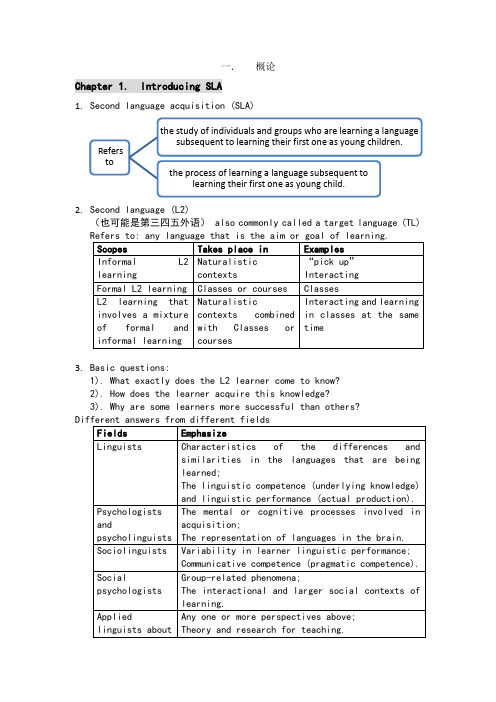
一.概论Chapter 1. Introducing SLA1.Second language acquisition (SLA)2.Second language (L2)(也可能是第三四五外语) also commonly called a target language (TL)3.Basic questions:1). What exactly does the L2 learner come to know?2). How does the learner acquire this knowledge?3). Why are some learners more successful than others?4.linguistic; psychological; social.Only one (x) Combine (√)Chapter 2. Foundations of SLAⅠ. The world of second languages1.Multi-; bi-; mono- lingualism1)Multilingualism: the ability to use 2 or more languages.(bilingualism: 2 languages; multilingualism: >2)2)Monolingualism: the ability to use only one language.3)Multilingual competence (Vivian Cook, Multicompetence)Refers to: the compound state of a mind with 2 or more grammars.4)Monolingual competence (Vivian Cook, Monocompetence)Refers to: knowledge of only one language.2.People with multicompetence (a unique combination) ≠ 2 monolingualsWorld demographic shows:3.Acquisition4.The number of L1 and L2 speakers of different languages can only beestimated.1)Linguistic information is often not officially collected.2)Answers to questions seeking linguistic information may not bereliable.3) A lack of agreement on definition of terms and on criteria foridentification.Ⅱ. The nature of language learning1.L1 acquisition1). L1 acquisition was completed before you came to school and thedevelopment normally takes place without any conscious effort.2). Complex grammatical patterns continue to develop through the1) Refers to: Humans are born with an innate capacity to learnlanguage.2) Reasons:♦Children began to learn L1 at the same age and in much the same way.♦…master the basic phonological and grammatical operations in L1 at 5/ 6.♦…can understand and create novel utterances; and are not limited to repeating what they have heard; the utterances they produce are often systematically different from those of the adults around them.♦There is a cut-off age for L1 acquisition.♦L1 acquisition is not simply a facet of general intelligence.3)The natural ability, in terms of innate capacity, is that part oflanguage structure is genetically “given” to every human child.3. The role of social experience1) A necessary condition for acquisition: appropriate socialexperience (including L1 input and interaction) is2) Intentional L1 teaching to children is not necessary and may havelittle effect.3) Sources of L1 input and interaction vary for cultural and socialfactors.4) Children get adequate L1 input and interaction→sources has littleeffect on the rate and sequence of phonological and grammatical development.The regional and social varieties (sources) of the input→pronunciationⅢ. L1 vs. L2 learningⅣ. The logical problem of language learning1.Noam Chomsky:1)innate linguistic knowledge must underlie language acquisition2)Universal Grammar2.The theory of Universal Grammar:Reasons:1)Children’s knowledge of language > what could be learned from theinput.2)Constraints and principles cannot be learned.3)Universal patterns of development cannot be explained bylanguage-specific input.Children often say things that adults do not.♦Children use language in accordance with general universal rules of language though they have not developed the cognitive ability to understand these rules. Not learned from deduction or imitation.♦Patterns of children’s language development are not directly determined by the input they receive.。
《金块2》又名《淘金者2》各关截图、密码、攻略概要

《金块2》又名《淘金者2》各关截图、密码、攻略概要简介:FC经典老游戏《金块2》(淘金者2),单调的音乐,简陋的画面,但却是真正的智力游戏。
现发布各关初始图(自11关起附密码截图),并各关攻关重点,跟同好交流。
密码使用方法:非暂停状态下按“选择”键,进入选关界面;按“A”或“B”改变关卡序号;按“开始”键,画面上出现小方格;对照密码截图,按方向键调整方格图案,按单跳键确定当前密码图案并进入下一方格;密码输入完毕,按按单跳键便进入所选关卡。
攻略:01.踩着正在下坠的兔子的脑袋(基本技),到对面吃掉最高处的2块金子。
分层分时挖坑(基本技),吃掉第二个长梯右边口字形里的库存。
陷害(这个词真是准确)一个兔子(基本技),等它复活掉到有金块的空档里,逐层挖双坑把它向右释放(基本技);下到二楼以后再让它去死(^.^)。
在二楼吃掉右下1块、中间小屋一块,再去二楼左边(千万不要急着下到底楼)。
利用二楼短梯旁边那个砖块的复合延时(基本技),搞定最后3块。
本关几乎用到了二代的所有技巧。
02.在长梯不同高度上停留(基本技:随时暂停,移动方向键进行查看),使全部兔子集合到左边长梯附近;搞定右边以后再跟它们交换场地。
03.要快。
在兔子逼近的危急情况下,梯网上的空洞或许可以帮忙。
04.从二楼开始,逐层将空肚兔子引到下一层。
05.一次引一只兔子追到长梯上来,哄它入坑垫底;然后放它出去。
06.捉放曹。
小心:不要让吃了金块的兔子掉到最高一层的坑里了。
07.捉放曹。
注意保证获释兔子下层的空心砖不被其它兔子占用。
08.声东击西,调兔离山。
要快。
09.初始点的右边挖坑,引诱兔子从这里去下一层。
以下类推。
10.落地就完蛋。
所以必须向右逃出。
自由落体显然是不行的;而何时点按向下键,按多长时间,则需要自己把握。
chapter1 国际汇兑与结算概述1

24
案例讨论
跨境贸易人民币结算
/NEWS/FINANCE/2014006/01B8822BC605-431D-A439-32089F46AAFC.SHTML
做中学、学中做!
2018/11/1
1981 523亿元
1991 9200亿元
2001 7.4万亿元
2007 17.3万亿元
800元
5900元
1.3万元 255万元
3
在货币超发洪流中,中国也 已经成长为世界巨人。
2018/11/1
4
宏观经济学告诉我们:
M0=流通中的现金,即我们通常所称的现金。 M1(狭义货币量)=M0+活期存款 M2(广义货币量)=M1+定期存款+储蓄存款+其他存款+证券公司客户保证金。
货物单据化、履约证书化,便于银行办理国际结算
(凭货付款到凭单付款)(From dealing in goods to
dealing in documents)
从买卖直接结算发展到通过银行结算(From payment
between buyers and sellers to payments effected through foreign exchange banks)
通常用广义货币供应量/国内生产总值(M2/GDP)的比例来说明货
币与实体经济之间的量化比例关系,反映一个经济体金融深化的程度。 一般而言,M2/GDP越大,货币超发越严重。
年份 GDP 1978 3645亿元 2009 33.54万亿元 比较结果 92倍
M2
0.0859Leabharlann 万亿60.62万亿元增加了705倍
由有形贸易引起的,是国际贸易的基础
朗文2A chapter1 核心词核心句及语法重点
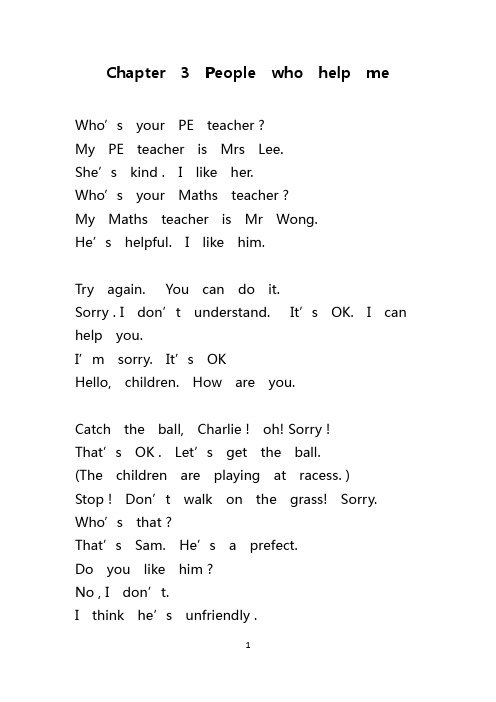
Chapter 3 People who help meWho’s your PE teacher ?My PE teacher is Mrs Lee.She’s kind . I like her.Who’s your Maths teacher ?My Maths teacher is Mr Wong.He’s helpful. I like him.Try again. You can do it.Sorry . I don’t understand. It’s OK. I can help you.I’m sorry. It’s OKHello, children. How are you.Catch the ball, Charlie ! oh! Sorry !That’s OK . Let’s get the ball.(The children are playing at racess. )Stop ! Don’t walk on the grass! Sorry. Who’s that ?That’s Sam. He’s a prefect.Do you like him ?No , I don’t.I think he’s unfriendly .The prefect’s just doing his job, boys. Don’t worry. I can help you.Thank you, Mr Ho. You’re great !( The caretaker gets the ball for the boys. ) Look out !Here you are , boys.Oh ! thank you very much !Who’s that ?That’s Mrs Tam. She’s our new Music teacher . I like her. I think she’s friendly .Dear Mr Mark,You are a good caretaker.You are helpful and friendly.Thank you very much !CandyDear Mrs Wu,You are a great bus driver.You are helpful and kind.Thank you very much !CharlieKey Wordsme you him herMiss Mrs Mr like whoExtention WordsPE Maths Chinese English kind friendly helpful try nuderstand catch recess prefect unfriendly unkind unhelpful job Music driver swimmer hawker caretakerKey Sentences1.Who is your PE teacher ?2.My PE teacher is Mrs Lee.3.She’s kind.4.My Maths teacher is Mr Wong.5.He’s helpful.6.I like him / her.Extention Sentences1.Try again . you can do it.2.Sorry , I don’t understand.3.It’s OK. I can help you.4.Catch the ball .5.Let’s get the ball.6.Don’t walk on the grass.7.Do you like him / her ?8.Yes , I do./ No, I don’t.9.I think he’s unfriendly.10.The prefect’s just doing his job.11.Look out !12.Who’s that ?13.You’re helpful and friendly.。
《金银岛》Chapter1-3,并用中文概括大意
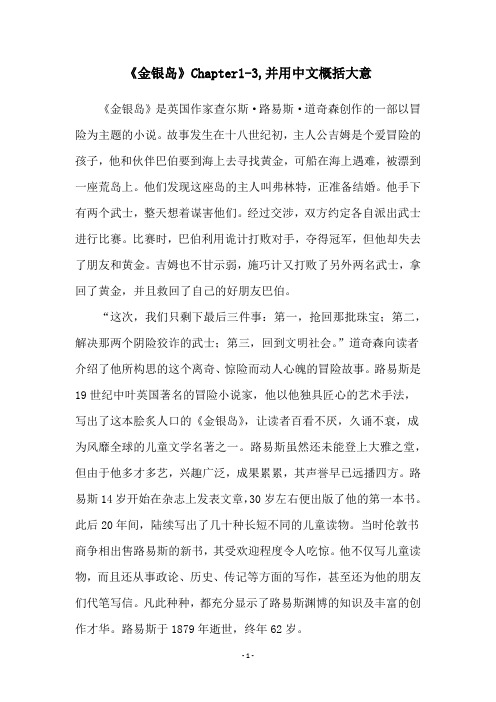
《金银岛》Chapter1-3,并用中文概括大意《金银岛》是英国作家查尔斯·路易斯·道奇森创作的一部以冒险为主题的小说。
故事发生在十八世纪初,主人公吉姆是个爱冒险的孩子,他和伙伴巴伯要到海上去寻找黄金,可船在海上遇难,被漂到一座荒岛上。
他们发现这座岛的主人叫弗林特,正准备结婚。
他手下有两个武士,整天想着谋害他们。
经过交涉,双方约定各自派出武士进行比赛。
比赛时,巴伯利用诡计打败对手,夺得冠军,但他却失去了朋友和黄金。
吉姆也不甘示弱,施巧计又打败了另外两名武士,拿回了黄金,并且救回了自己的好朋友巴伯。
“这次,我们只剩下最后三件事:第一,抢回那批珠宝;第二,解决那两个阴险狡诈的武士;第三,回到文明社会。
”道奇森向读者介绍了他所构思的这个离奇、惊险而动人心魄的冒险故事。
路易斯是19世纪中叶英国著名的冒险小说家,他以他独具匠心的艺术手法,写出了这本脍炙人口的《金银岛》,让读者百看不厌,久诵不衰,成为风靡全球的儿童文学名著之一。
路易斯虽然还未能登上大雅之堂,但由于他多才多艺,兴趣广泛,成果累累,其声誉早已远播四方。
路易斯14岁开始在杂志上发表文章,30岁左右便出版了他的第一本书。
此后20年间,陆续写出了几十种长短不同的儿童读物。
当时伦敦书商争相出售路易斯的新书,其受欢迎程度令人吃惊。
他不仅写儿童读物,而且还从事政论、历史、传记等方面的写作,甚至还为他的朋友们代笔写信。
凡此种种,都充分显示了路易斯渊博的知识及丰富的创作才华。
路易斯于1879年逝世,终年62岁。
我们的探险就此展开了!到了夜晚,女巫出来了,男爵他们便趁机溜走了。
第二天晚上,一切平安无事,孩子们高高兴兴地睡觉了。
半夜里,吉姆忽然听见有人喊他,醒来一看原来是爸爸!父亲嘱咐吉姆把昨晚梦见黄金的事告诉大家,吉姆怕招惹麻烦,没敢讲真话。
这时候,金子又钻入吉姆的耳朵,逼迫他把实情告诉了大家……这些都太神秘了,简直像魔幻一样,有点不真实。
“可能就是这么回事吧?总是有一丝希望的嘛!吉姆鼓励大家勇往直前,克服困难,一定要找到黄金。
Chapter1BusinessNegotiation商务谈判

Chapter 1 Business Negotiation
1.Some Basic Concepts of Negotiation
(1)The Concept of Negotiation A negotiation is a process of communication between parties
• 2.The Forms of Business Negotiation
Chapter 1 Business Negotiation
3.The Overall Framework of International Business Negotiation
Background Atmosphere Factors
1)the best target; 2)the intermediate target; 3)the acceptable target.
Chapter 1 Business Negotiation
• 5.Basic Rules of International Business Negotiation
• 1.Some Basic Conceots of Negotiation • 2.The Forms of Business Negotiation • 3.The Overall Framework of International Business
Negotiation • 4.Features of International Business Negotiation • 5.Basic Rules of International Business Negotiation • 6.The General Producer of International Negotiation • munication Skills for Negotiations • 8.Types of Negotiation Styles • 9.The Business Contract
Chapter1

1 pc 3.26 ly
1.2 A quick tour of the cosmos
To understand the universe, we must understand the relative scales of planets, stars, galaxies and the universe as a whole. We will journey from a campus scene to the limits of the cosmos in 12 steps. In each step we will widen our view by a factor of 100. That is, each successive picture will show a region of the universe that is 100 times wider than the preceding picture.
THE UNITED NATIONS DECLARES 2009 THE INTERNATIONAL YEAR OF ASTRONOMY 联合国宣布 2009年为国际天文年! 纪念伽利略400年前 首次使用望远镜观测太空。
Astronomy
The Solar System and Beyond
Michael A. Seeds Joseph R. Grundy Observatory Franklin and Marshall College
Fig. 1-4 Field of view enlarged 100 times from the previous image (NASA). This step in our journey shows our entire planet. The earth is 12,756 km in diameter and rotates on its axis once a day.
SCM-Chapter1

• Laura Ashley turns its inventory 10 times a
year, five times faster than 3 years ago
Assoc. Prof.-Dr. Liu Dacheng 5
Supply Chain Management : The True Magnitude
• Compaq estimates it cost $0.5 billion to $1 • •
billion in sales in 1995 because laptops were not available when and where needed When the 1 gig processor was introduced by AMD, the price of the 800 meg processor dropped by 30% P&G estimates it saved retail customers $65 million by collaboration resulting in a better match of supply and demand
Customer Order Cycle and Manufactur ing Cycle
Assoc. Prof.-Dr.Examples of Supply Chains
• Dell / Compaq • Toyota / GM / Ford • McMaster Carr / W.W. Grainger • Amazon / Borders / Barnes and Noble • Webvan / Peapod / Jewel
GNP.
Assoc. Prof.-Dr. Liu Dacheng
chapter1 第一章

Concepts in statistics1. However, this statistic conceals that levels of nitrogen dioxide have changed little since 1983.2. An average is a statistic of central tendency.3. Statistics are numerical quantities calculated from a sample or samples.4. Statistics is a range of techniques or procedures for collecting, organizing, analyzing and interpreting data.Classification of statistics⎩⎨⎧推断性描述性statistics erential statistics e descriptiv statistics infDescriptive statistics: 1) simple summary of the data 1+1=2 4x3=12 5-4=1 2) describe the basic features of the data 3) unchangeable 1+1=2 ≠34) quantitative description + graphical method5) objective description: observations and statistics 6) average deviation chapter 2 Inferential statistics1) inferences based on the descriptive statistics 76 in a test score 2) more or less subjective3) a conclusion beyond the data 4) from chapter 4 onPopulation and sampleShort stories by O. HenryA Blackjack Bargainer A Call LoanA Chaparral Christmas Gift A Chaparral Prince A Little Local Colour A Little Talk About Mobs A Matter Of Mean Elevation A Newspaper Story A Poor Rule A Sacrifice Hit A Technical ErrorAn Afternoon MiracleBest-sellerBlind Man's HolidayBuried TreasureCalloway's CodeChristmas By InjunctionConfessions Of A HumoristCupid A La CarteGeorgia's RulingHe Also ServesHearts And CrossesHearts And HandsHygeia At The SolitoMadame Bo-peep, Of The RanchesNo StoryOne Dollar's WorthOut Of NazarethRound The CircleRus In UrbeSchools And SchoolsSeats Of The HaughtySociology In Serge And StrawSuite Homes And Their RomanceThe Caballero's WayThe CactusThe Detective DetectorThe Dog And The PlayletThe Gift Of The MagiThe Handbook Of HymenThe Head-hunterThe Hiding Of Black BillThe Higher AbdicationThe Higher PragmatismThe Hypotheses Of FailureThe Indian Summer Of Dry Valley Johnson The Last LeafThe Marry Month Of MayThe Missing ChordThe Moment Of VictoryThe Pimienta PancakesThe Princess And The PumaThe Ransom Of MackThe Ransom Of Red ChiefThe Red Roses Of ToniaThe Reformation Of CalliopeThe Roads We TakeThe Rose Of DixieThe Rubber Plant's Story The Snow ManThe Song And The SergeantThe Sparrows In Madison Square The Sphinx AppleThe Theory And The Hound The Third Ingredient The Whirligig Of Life The World And The Door Thimble, Thimble To Him Who Waits Tommy's BurglarTwo Thanksgiving Day Gentlemen 警察与赞美诗带家具的房间 托宾的掌纹 麦琪的礼物 二十年后最后一片常春藤叶 财神与爱神 失算五月是个结婚月 艾基·舍恩斯坦的春药 心理分析与摩天大楼 失语症患者逍遥记 一笔通知放款 好汉的妙计 剪狼毛 决斗各有所长的结局 部长的良策 几位侦探 一千元 幽境过客 “真凶”伯爵和婚礼的客人 无缘 似戏非戏 寻找巧遇的人 托尼娅的红玫瑰 生活的波折 卖冤仇 多情女的面包::inf ⎩⎨⎧website population inite population finite populationFrequency , relative frequency, probabilityFrequency is the observed number of occurrences.Demo of Wordsmith3 with Brown CorpusRelative frequency is the proportion of the frequency of one observation over the total frequencies of all the observations.class 1 class 2 class 3 class 4 class 576 76 35 45 7678 69 78 78 4567 67 67 67 6798 98 67 98 9870 86 70 65 6746 46 46 46 4698 98 45 98 8770 34 70 36 7073 73 73 73 7384 84 84 84 8991 87 78 77 91average 77.36364 74.36364 64.81818 69.72727 73.54545Probability: the average of averages.Classifications of variables and levels of measurementVariable able ible1. conceptual definition of variablesVariable: independent variable: variables manipulated by the researcher.Dependent variable: variables measured from the subjects2. operational classification of variables:1) nominal level of measurement2) ordinal level of measurement3) interval level of measurement4) ratio level of measurement四、变量及其测量水平研究语言首先要确定具体研究的语言现象(又称观察值),它可能是语言学理论知识,如音位、形位、单词、短语、句子、段落或语篇;也可能是语言习得及学习策略;或是语言测试理论与实践。
chapter1上课笔记
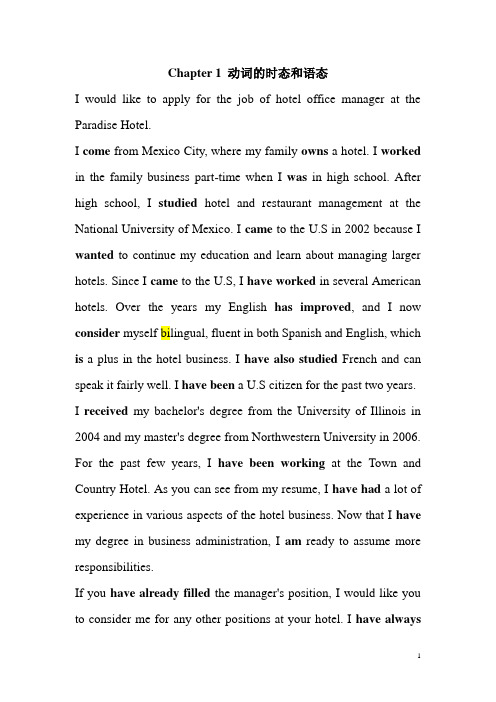
Chapter 1 动词的时态和语态I would like to apply for the job of hotel office manager at the Paradise Hotel.I come from Mexico City, where my family owns a hotel. I worked in the family business part-time when I was in high school. After high school, I studied hotel and restaurant management at the National University of Mexico. I came to the U.S in 2002 because I wanted to continue my education and learn about managing larger hotels. Since I came to the U.S, I have worked in several American hotels. Over the years my English has improved, and I now consider myself bilingual, fluent in both Spanish and English, which is a plus in the hotel business. I have also studied French and can speak it fairly well. I have been a U.S citizen for the past two years.I received my bachelor's degree from the University of Illinois in 2004 and my master's degree from Northwestern University in 2006. For the past few years, I have been working at the Town and Country Hotel. As you can see from my resume, I have had a lot of experience in various aspects of the hotel business. Now that I have my degree in business administration, I am ready to assume more responsibilities.If you have already filled the manager's position, I would like you to consider me for any other positions at your hotel. I have alwaysloved the hotel business, and I know I can be an asset to your hotel. Thank you for considering my application. I look forward to meeting with you soon.Sincerely,Daniel Mendoza1.Daniel has been(be) in Chicago for a few years. He has had (have) several interviews. Mr. Johnson got (get) a letter from Daniel last week. There have been (be) many applications for the job since the recruitment information was posted (post) on the official website. According to his resume, Daniel's parents have always been (always, be) in the hotel business. Daniel has never worked (never, work) as a programmer. He had written (write) many cover letters before he wrote (write) this one. Our company has interviewed(interview)20 applicants so far. Maybe Daniel will be interviewed (interview) by the HR manager next week. We will have finished (finish) the recruitment by the end of this month.2.HR manager---HR Daniel--DHR: I (have)looked at your resume. I see you work in a hotel.D: Yes, I do.HR: How long have you been doing this job?D: I have been doing this job for only a short time. But I have gained a lot experience in the hotel business. In fact, my parents own a hotel in Mexico.HR: How long have your parents owned a hotel?D: Most of their lives.HR: Have you seen your parents recently?D: Yes, I have. My mother has been to the U.S a few times to see me. But my father has never been here because someone has to stay at the hotel all the time. He has told me many times, "When you are an owner of a business, you don't have time for vacations." But I don't want to be an owner now. I just want a job as a manager. Have you filled the position yet?HR: No, we haven't. I have already interviewed several people and will interview a few more this week. When we make our decision, we will let you know.It is time we got down to writing our paper/thesis.I wish I were 25 and could do whatever I want to do.I was wondering if you could come over to spend the weekend together.2.3.42)You are always complaining.3)她老爱吹嘘她家孩子怎么怎么地。
WTE2A-Chapter1-6知识点梳理

WTE2A-Chapter1-6知识点梳理WTE 2A Chapter1 Coming to school一、词汇(1)要求会读会认会用:bus 公汽 minibus 小型公汽 school bus 校车 ferry 渡船 tram有轨电车train火车 MTR港式地铁 LRT轻轨 pupil小学生 car 小汽车by+交通工具(2)不作要求,了解意思:ask 问bike 自行车 taxi 出租车walk 走路join 加入let’s=let us让我们二、句型(要求掌握听说读背用)1、 How do you come to school? 你是怎么来学校的?2、 I come to school on foot. 我步行上学的。
3、 I come to school by MTR. 我乘地铁上学的。
4、 How many pupils come by car? 有多少学生乘车来的?5、 One pupil comes by car. 一个学生乘车来的。
6、 How many pupils come by school bus? 有多少学生乘校车来的?7、 Seven pupils come by school bus. 7个学生乘校车来。
三、不作要求内容,了解意思1、 Then get into groups. 然后分组。
2、 Ask your friends. 问问你的朋友们。
3、Let’s get into a group. 我们加入一个组。
4、 We also come to school by minibus. 我们也是乘小型公汽上学的。
5、 Come on , Wendy. Join a group. 来吧,Wendy 。
加入一个组。
Chapter1 Coming to school复习一、单词巩固练习bus ________________ 迷你巴士_______________地铁_______________ LRT_______________电车_______________ train_______________的士_______________ ferry_______________ pupil ______________补全单词m_n_bu_ p_p_l fe___y a_kjo_n w_lk sc_ool L_T二、句子练习连线题Ask your friends 然后组成小组Come on , Wendy 去问一下你的朋友们Then get into groups 来吧,WendyJoin a group 加入一个小组补全句子1 How do you ___________(come/ comes) to school?2 He ___________ (come/ comes) to school by bus.3 How mang ___________(pupil/pupils) ___________ (come/ comes) to s chool by minibus?4 Three ___________( pupil/pupils) __________(come/ comes) to school by minibus.WTE 2A Chapter2 About me一、词汇(1)要求会读会认会用:live 居住 where哪里 telephone 电话 meet 遇见 home家new新的our我们的I’m=I am What’s=What is(2)不作要求,了解意思:Chai Wan 柴湾 New Territories新界 Wan Chai 湾仔Hong Kong Island香港岛Mong Kok 旺角Kowloon九龙Tuen Mun屯门Tsuen Wan荃湾Kwun Tong观塘minute分钟later随后again再次get in上车win赢hit打arrive 到达tin 罐number 数字、号码二、句型(要求掌握听说读背用)1、Where do you live? 你居住在哪里?2、 I live in Xiling District./Yiling District.我居住在西陵区。
国际金融课件--Chapter 1. Balance of Payment
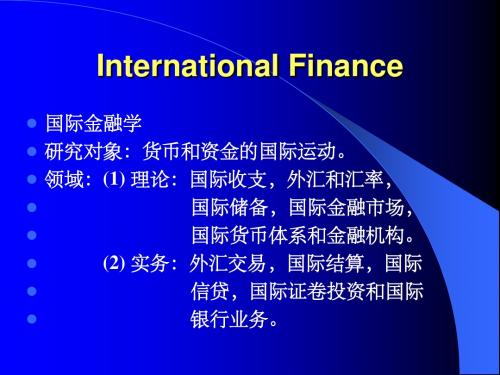
Other service
(2) Imports Of which: Merchandise
Investment income paid
-716.6 -489.4 -108.9 -118.3
+8.0 -3.7
Other services (3) Net unilateral transfers
Balance on current account
黄金输出
本币下跌
银行准备金 下跌 出口增加
逆 差
顺 差
本币上升
进口增加
银行准备金 增加
黄金输入
物价与现金流动机制 流程图 国际收支逆差 黄金外流
通货紧缩 物价下跌 出口增加,进口减少
国际收支平衡
IFM’s Definition
1. 2. 3.
4.
一个经济实体与其他经济实体的商品, 劳务和收益的转移。 这个经济实体债权债务的变化以及特别 提款权,货币黄金的变动。 无需偿还的单方面转移。 会计上需要用来平衡未被抵消的对外交 易的对应科目。
Main Items
二 国际收支平衡表的主要内容 (一)经常项目Current Account (二)资本项目Capital Account (三)平衡项目Balancing Account
Error and Omission-2
。从总量看,我国的国际收支在“错误与遗 漏项目”累积了相当大的规模。据统计在 1982年-1998间,我国国际收支平衡表中 “错误与遗漏项目”累计高达1082·亿美元。 4 从年度规模看,1994年到1998年我国国际收 支平衡表中的“误差与遗漏项目”则分别高 达98亿美元、178亿美元、156亿美元、169亿 美元、166亿美元。巨大的资本外逃不仅影响 到我们对国际收支形势的正确把握,影响对 宏观经济走势的准确分析,而且也反映出资 本外逃问题的加剧。
语言学chapter1课后练习答案
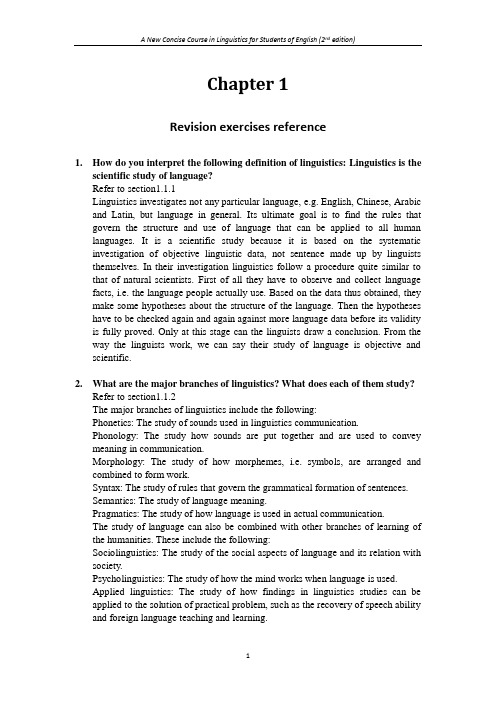
Chapter 1Revision exercises reference1.How do you interpret the following definition of linguistics: Linguistics is thescientific study of language?Refer to section1.1.1Linguistics investigates not any particular language, e.g. English, Chinese, Arabic and Latin, but language in general. Its ultimate goal is to find the rules that govern the structure and use of language that can be applied to all human languages. It is a scientific study because it is based on the systematic investigation of objective linguistic data, not sentence made up by linguists themselves. In their investigation linguistics follow a procedure quite similar to that of natural scientists. First of all they have to observe and collect language facts, i.e. the language people actually use. Based on the data thus obtained, they make some hypotheses about the structure of the language. Then the hypotheses have to be checked again and again against more language data before its validity is fully proved. Only at this stage can the linguists draw a conclusion. From the way the linguists work, we can say their study of language is objective and scientific.2.What are the major branches of linguistics? What does each of them study?Refer to section1.1.2The major branches of linguistics include the following:Phonetics: The study of sounds used in linguistics communication.Phonology: The study how sounds are put together and are used to convey meaning in communication.Morphology: The study of how morphemes, i.e. symbols, are arranged and combined to form work.Syntax: The study of rules that govern the grammatical formation of sentences.Semantics: The study of language meaning.Pragmatics: The study of how language is used in actual communication.The study of language can also be combined with other branches of learning of the humanities. These include the following:Sociolinguistics: The study of the social aspects of language and its relation with society.Psycholinguistics: The study of how the mind works when language is used.Applied linguistics: The study of how findings in linguistics studies can be applied to the solution of practical problem, such as the recovery of speech ability and foreign language teaching and learning.3.In what basic ways does modern linguistics differ from traditionalgrammar?Refer to section 1.1.3, part 6.Modern linguistics and traditional grammar differ in at least the following three ways.Firstly, linguistics is descriptive while traditional grammar is prescriptive. A modern linguist is interested in what is said, not in what he thinks ought to be said.He describes language in all its aspects, but does not prescribe rules of “correctness”.Second, modern linguistics regards the spoken language as primary, not the written. Traditional grammarians, on the other hand, tend to emphasize, maybe over-emphasize, the importance of the written word, partly because of its permanence.Thirdly, modern linguistics differs from traditional grammar also in that it does not force languages into a Latin-based framework. To modern linguists, it is unthinkable to judge one language by standards of another.4.Is modern linguistics mainly synchronic or diachronic? Why?Modern linguistics is mainly synchronic because modern linguists believe that unless the various states of a language in different historical periods are successfully studied, it would be difficult to describe the changes that have taken place in its historical development.5.For what reasons does modern linguistics give priority to speech rather thanto writing?Refer to section 1.1.3, part 3.First, from the point of view of linguistic evolution, speech is prior to writing.The writing system of any language is always “invented” by its users to record speech when the need arises. Then in everyday communication, speech plays a greater role than writing in terms of the amount of information conveyed. And also, speech is always the way in which every native speaker acquires his mother tongue, and writing is learned and taught later when he goes to school. Above all, for modern linguistics, spoken language reveals many true features of human speech while written language is only the “revised” record of speech .Thus the former is authentic language in their eyes, and thus the source of data for their investigation.6.How i s Saussure’s distinction between language and parole similar toChomsky’s distinction between competence and performance?According to Saussure, language refers to the abstract linguistic system shared by all the members of a speech community, and parole refers to the realization of language in actual use. Language is the set of conventions and rules which language users all have to abide by, and parole is the concrete use of theconventions and application of the rules. Chomsky defines competence as the id eal user’s knowledge of the rules of his language, and performance the actual realization of this knowledge in linguistic communication. The similarity between the two distinctions is that Saussure’s language and Chomsky’s competence refer to what the lang uage user knows about his language, and Saussure’s parole and Chomsky’s performance refer to the actual use of language.7.What characteristics of language do you think should be included in a good,comprehensive definition of language?A comprehensive definition of language should include the following features:1) Language is governed by rules; thus it is a system, or it is systematic.2) Language is primarily spoken, rather than written; therefore the system ofsymbols used in language is vocal rather than written.3) The symbols used in language are arbitrary, i.e. there is no logical connectionbetween the symbols and meanings.4) Language is used by humans to communicate with each other.5) And finally language is human-specific, i.e. it is unique to the human species.All the five features mentioned above are included in the following concise definition of language: Language is a system of arbitrary vocal symbols used for human communication.8.What are the main features of human language that have been specified by C.Hockett to show that it is essentially different from animal communication system?In the coursebook five of the twelve features of human language specified by C.Hockett are discussed: arbitrariness, productivity or creativity, duality, displacement, and cultural transmission.By arbitrariness it is meant that the symbols used in human language are arbitrary,i.e. there is no logical connection between the symbols and what they stand for.This feature may seem to be shared by animal communication systems, as the means used by animals to communicate are also arbitrary. But the arbitrary nature of human language is a sign of sophistication and makes it possible for human language to have an unlimited source of expression.The feature of productivity means that language is productive or creative, i.e. it is possible for its users to construct and understand an unlimited number of sentences, including sentences they have never heard before. This feature is undoubtedly human-specific for animals have, if any, a very limited number of signals for communication.Duality is a feature of the structure of the human language system, which consists of two levels. At the lower or the basic level there exist a limited number of sounds which are meaningless, while at the higher or the superficial level these meaningless sounds can be arranged and rearranged in various ways to form meaningful language units, unlimited in number. This enables language users to express whatever they want to express. This feature is not possessed by anyanimal communication system.The feature “displacement” means that language can be used to refer to things which are present or not present, real or unreal, in the past, present, or future. This means that the expressive power of human language is not restricted to “the here and now.” In contrast, animal communication is restricted to the current time and circumstances. Cultural transmission, in contrast to genetic transmission, refers to the fact that human babies, though born with the ability to acquire a language, must be taught to use it. The ability to use a language is not transmitted genetically from our parents. But young animals seem to be born with the ability to use particular ways to communicate with their fellow creatures.9.What are the major functions of the language? Think of your own examplesfor illustration.Refer to section 1.2.3.To answer this question, you can base yourself on either tripartite framework or Jakobson’s model of language functions.According to the tripartite framework, there are three main functions: descriptive, expressive, and social.In Jakobson’s model, six functions have been specified: emotive, conative, referential, poetic, phatic communication, and metalinguistic.Supplementary exerciseWhy do people take duality as one of the important design features of human language? Can you tell us what language will be if it has no such design feature? Duality makes our language productive. A large number of different units can beformed out of a small number of elements -----for instance, tens of thousands of words out ofa small set of sounds, around 48 in the case of the English language. And out of the huge number of words, there can be astronomical number of possible sentences and phrases, whichin turn can combine to form unlimited number of texts. Most animal communication systemsdo not have this design feature of human language.If language has no such design feature, it will be like animal communicationalsystem which will be highly limited . It cannot produce a very large number of sound combinations ( e.g. words ), which are distinct in meaning.。
- 1、下载文档前请自行甄别文档内容的完整性,平台不提供额外的编辑、内容补充、找答案等附加服务。
- 2、"仅部分预览"的文档,不可在线预览部分如存在完整性等问题,可反馈申请退款(可完整预览的文档不适用该条件!)。
- 3、如文档侵犯您的权益,请联系客服反馈,我们会尽快为您处理(人工客服工作时间:9:00-18:30)。
1.3 黄金鉴别法
– 色低者刚硬,重混者有弹性,脆而易断。
– 四敲声,
• • • • 两件相同的金饰物相撞 高色者其声卜卜 低清金者其声铮铮 混金者其声当当。
1.4 黄金饰品鉴别法
•黄金饰品的分类: 纯金首饰 K金首饰 •纯金首饰: 又称足金首饰。金无足赤,最纯的黄金也只能达到 99.9999%,是专门用做标准试剂的“试剂金”。 首饰店里出售的纯金首饰,其含量实际为99%、99.99% 两种。前者称为“二九金”,后者称为“四九金”。 纯金质地柔软,色泽赤黄,永不泛色。 用纯金制成的首饰体积小、价值高,是理想的保值商品 和装饰品。 因其质地柔软,容易变形,不能镶嵌各种精美的宝石, 所以款式不易翻新,花式品种较少。
3
1.1 黄金概述
• “菜百”:
– 黄金首饰在各大商场的首饰专卖区都有着不 可替代的位置,它可以算是首饰中的“龙头 老大”。
• 很多中年女性身上也许没有昂贵的钻石 首饰,也没有时尚的水晶首饰,但总会 有一件黄金首饰。
4
1.1 黄金概述
• 黄金首饰变色之迷
– 佩带黄金首饰一段时间后,发觉变色或褪色 – 黄金首饰的变色或褪色与人体的汗液有密切的关系。 – 人的汗液99%是水 份,另外1%左右是人体体内的 废物及有害物质,如:氯化物,乳酸,尿素,尿素 氨等。 – 这些物质与黄金首饰中的银和铜接触后,就会产生 化学反应,产生氯 化银和硫化铜,并呈现深黑色的化 学盐。 – 这种化学盐常会从黄金首饰上掉落, 污染佩戴者的 皮肤,使皮肤上留下十分明显的黑色污迹。
1.4 黄金饰品鉴别法
• 第四法则----听声音:
– 成色在99%以上的真金往硬地上抛掷,会发 出叭哒声,有声无韵也无弹力。 – 假的或成色低的黄金声音脆而无沉闷感,一 般发出“当当”响声,而且声有余音,落地 后跳动剧烈。 – 真的金首饰抛在台板上,会发出“噗嗒”之 声。 – 假的或成色低的,抛的台板上声音尖亮,且 比真金跳得高。
5
1.1 黄金概述
– 化妆品已成为人们生活中不可或缺的“角色”之一。
• 如果涂抹在黄金 首饰佩戴部位的皮肤上,那么无疑给含有 化学物质的化妆品与最怕化学物质 侵蚀的黄金首饰“冤家 聚头”提供机遇,结果可想而之。
– 有的化妆品中,还含有 一些细微的硬粒,它能构成另 一种类型的污垢,从而磨耗黄金首饰。 – 地域环 境的因素也可能使黄金首饰失去亮丽的色泽
– 化学法:
• 又称试剂点试法 • 黄金不溶于单独的硝酸、硫酸和盐酸之中 • 银、铜等成分均能与硝酸起化学反应而被溶解
23
1.4 黄金饰品鉴别法
• 取金饰样品,将硝酸点在某一部位
– – – – 黄金不会变色 银制品,会生成氧化银而变黑 铜制品,生成二价铜盐而冒绿色泡沫 对含金量在95%以上的金饰品,用硝酸点试,表面变 化很小
– 真金首饰烧红后即放入水中,其色泽不变 – 假的当即变色,有一层氧化物附于表面
21
1.4 黄金饰品鉴别法
• 第六法则-----看标记:
– 国产黄金饰品都是按国际标准提纯配制成的, 并打上戮记
• “24K”标明“足赤”或“足金” • 18K金,标明“18K”字样 • 成色低于l0K者,按规定就不能打K金印号了。
• 较干的地域,空气中含 有较多的细微尘埃,沾染上人体后会 形成一种“人体砂纸”,它可以把黄金首饰 磨蚀出极细微的 碎屑,出现局部黑色污点等。
– 爽身粉或润肤霜 也含有类似的微粒,也会如上述一样 使黄金首饰黯然失色。量
黄金首饰是指以黄金为主要原料制作的首饰。 黄金的化学符号为Au,比重为17.4, 摩氏硬度为2.5。 黄金首饰从其含量上可分为纯金和K金两种。
43
44
1.6 生辰石
• 六月: 珍珠
– 它是生辰石中唯一不是天然矿物的宝石,是 产在珍珠贝里。 – 珍珠贝里的珍珠质量高但体积有限。 – 珍珠象征健康长寿。
– 目前社会上不法分子常用制造假牌号、仿制 戳记,用稀金、亚金、甚至黄铜冒充真金。 – 鉴别黄金饰品要根据样品进行综合判定来确 定真假和成色高低。
22
1.4 黄金饰品鉴别法
• 黄金饰品成色的准确鉴别方法:
– 试金石法:
• 选择质地细腻的黑色试金石,用含金量不等的标 准试金片(对金牌)在试金石上划出痕迹,再将所 要鉴定的金饰样品在同一试金石上划痕,滴上浓 硝酸去掉杂质,找出留在试金石上的痕迹与所划 的试金片痕迹对比,找出与饰品样品一样的色度, 对照样品金的标准度,即为所要测定金饰样品的 准确含金量。
– – – –
火试金法:经典标准有损分析法 化学光谱法:有损分析法 密度法(比重法):无损物理检测方法 X射线荧光光谱法:最先进的无损检测法
24
黄金饰品欣赏
25
黄金饰品欣赏
26
黄金饰品欣赏
27
黄金饰品欣赏
28
黄金饰品欣赏
29
黄金饰品欣赏
30
黄金饰品欣赏
31
黄金饰品欣赏
32
1.6 生辰石
第 1章
黄金鉴赏
1
第1章 黄金鉴赏
1.1 黄金概述 1.2 黄金首饰的含金量 1.3 黄金鉴别法 1.4 黄金饰品鉴别法 1.5 黄金饰品欣赏 1.6 生辰石
2
1.1 黄金概述
• 中国内地黄金年需求量是近300吨 • 世界第三大黄金需求国 • 陈景润腰藏黄金之谜(避邪,纯金杀死病菌):
– 治疗类风湿关节炎 – 佩带金戒指的病人戴戒指的左手无名指关节病情显著轻 于右手同样部位的指关节 – 未佩带戒指的病人,他们左右两手的指关节病情完全相 同 – 戒指旁边的手指,即小指和中指关节的病情,也要比离 戒指较远的食 指、拇指关节的病情来的轻
• 宝石生辰石的使用,大约始于1562年的 德国或波兰,后流行于全世界。 • 由于不同国家和民族对宝石的爱好不同, 各国规定的十二个月的生辰石品种也不 同。
33
1.6 生辰石
34
1.6 生辰石
• 一月 :石榴石
– 带棱角、晶面近圆粒状、形似石榴籽而得名, 我国江苏产的石榴石色红艳丽,可与红宝石 媲美,商品名称为石榴红宝石。 – 台湾产的翠榴石鲜绿可爱,可进入高档宝石 行列。 – 石榴石象征忠贞、友爱。
纯金的含量为99%以上, 最高可达到99.99%。 K金首饰是在黄金材料种加入其他的金属(如银、同)制造而 成的首饰,又成为“开金”、“成色金”。 由于金属的加入量有多有少,便形成了K金首饰 的K数。
含量表示方法:
24K的含金量是99%以上 18K的含金量是75%以上 12K的含金量是50%以上 6K的含金量是25%以上
• 黄金的鉴别------“四鉴法”:
– – – – 初步鉴 磨而鉴 硝酸鉴 焊药鉴
12
1.3 黄金鉴别法
• 初步鉴:
– 一辨色:
• 看黄金外表色泽,俗称“七青八黄九五赤”,纯金 光润闪灿,混金则有麻涩小点。
– 二掂重:
• 以手掂其分量看与体积大小是否相称,形状大而较 轻者可能掺假。
– 三折性:
• 将金饰品以手折之,很软的是高清金 • 低及混者则不软。 • 小件饰金可用双手弯折:
– 无论是镀金首饰、包金首饰,还是铜首饰,一般不带黄 金首饰的印鉴或所带印鉴不 同于黄金首饰 – 有的首饰刻有英文字母“GK”,其含义是“镀金”
11
1.3 黄金鉴别法
• 黄金的分类:生金与熟金
– 生金主要有砂金和矿金两种。 – 熟金有清色金(含有白银)、混色金(含有 银、铜、铝等金属)和K金三种。
39
40
1.6 生辰石
• 四月: 钻石
– 这种世界上最硬的天然物质是宝石中最贵重 的。 – 钻石是在极高压的条件下结晶而成。 – 钻石经紫外线照射能发出淡青色荧光,因而 我国古代又称夜明珠。 – 钻石的无比坚硬象征爱情的忠贞不渝。
41
42
1.6 生辰石
• 五月: 祖母绿
– 它的成分与海蓝宝石相同,其可贵之处在于 纯正鲜艳的绿色,有“绿色之王”的美誉。 – 祖母绿象征幸福和爱情。
9
1.2 黄金首饰的含金量
• 几种类型黄金之区别:
– 纯金首饰的质地较软,容易弯折,色泽金黄、纯正、柔 和,手感沉 重。 – K金首饰质地比较硬,色泽是黄中带白,并依照K数的 减少,黄色渐浅。K金首饰的 手感也不如纯金首饰沉重。 – 无论是纯金还是K金的首饰上都有印鉴,黄金首饰上 的 印鉴,有用金字的,也有用Kg的。标明着相应的K数, 此外,首饰上还标志着不同生 产厂家的产地印鉴。 – 镀金首饰是在其他金属首饰表面用电镀法镀上一层金 色 ,颜色与真金首饰颜色相 仿,金光闪闪,新是较难 以辨认。 – 镀金首饰手感较轻,质地较硬,用久了易褪色。
17
1.4 黄金饰品鉴别法
• 第二法则-----掂重量:
– 黄金的比重为19.32,重于银、铜、铅、锌、铝等 金属。 – 如同体积的黄金比白银重40%以上,比铜重1.2倍, 比铝重6.1倍。 – 黄金饰品托在手中应有沉坠之感,假金饰品则觉轻 飘。 – 此法不适用于镶嵌宝石的黄金饰品。 – 真的金首饰颜色深黄,过分深红的为伪金;浅色的 为银质、铝质等混合金。
18
1.4 黄金饰品鉴别法
• 第三法则----看硬度:
– 纯金柔软、硬度低,用指甲能划出浅痕,牙 咬能留下牙印。 – 成色高的黄金饰品比成色低的柔软,含铜越 多越硬。 – 折弯法也能试验硬度,纯金柔软,容易折弯, 纯度越低,越不易折弯。 – 真的金首饰用手弯折时质软,易弯不断,用 手拉一下易直;用较硬的东西划一下会有痕 迹; – 假金、镀金、包金或掺杂成色低的金器,用 19 手弯折时质较硬,易断不易弯
15
1.4 黄金饰品鉴别法
• K金:
指在黄金中加一定比例的银、铜、锌等金属, 以增加其强度与韧性。 K金(Karat Go1d)的“K”是“Karat”的缩写。
